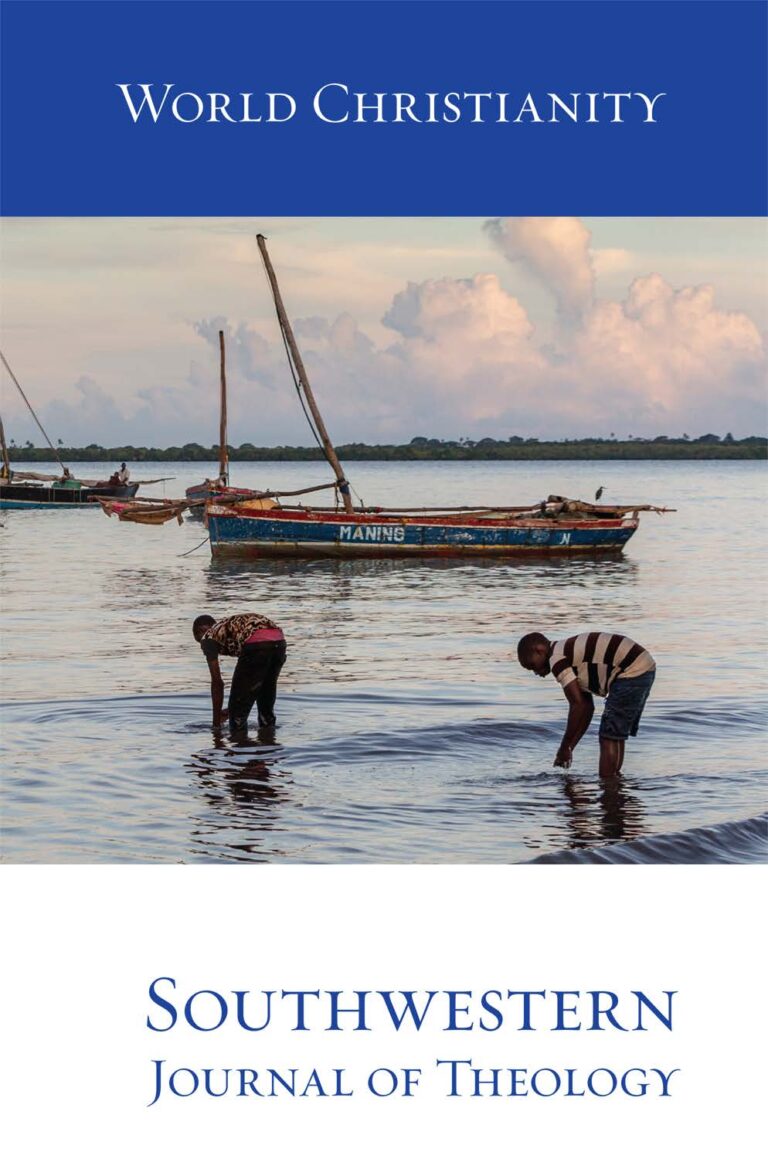
World Christianity
Southwestern Journal of Theology
Volume 61, No. 2 – Spring 2019
Managing Editor: W. Madison Grace II
By Jeremy M. Kimble. Grand Rapids: Kregel Academic, 2017. 272 pages. Softcover, $19.99
Throughout this helpful volume, readers are invited to investigate the closely related topics of church membership and church discipline with the help of biblical, systematic, and pastoral insight. These closely related subjects occupy an interest from the academic guild as well as professional clergy, all of whom seek to assess cogent answers and their implications for effective 21st century ecclesial ministry. Jeremy Kimble, assistant professor of theology at Cedarville University, offers readers yet another selection in the popular and well received 40 Questions series of books, all edited by Benjamin Merkle. Each volume in this series follows the same approach within its specific inquiry. Authors ask direct questions of the subject matter at hand, provide a three to four page response, and conclude each chapter with insightful reflection questions.
In Kimble’s volume, the forty questions are divided into four parts: Part One addresses “General Questions about Membership and Discipline” (consisting of four questions); Part Two addresses “General Questions about Church Membership” (consisting of sixteen questions); Part Three addresses “General Questions about Church Discipline” (consisting of eighteen questions); and finally, Part Four addresses “Concluding Questions about Membership and Discipline” (consisting of two questions). Thus, the bulk of Kimble’s focus lies within parts two and three, yet he addresses every question with the same strategy. For every question, Kimble states his inquiry clearly, situates the importance of the question with historical and cultural clarity, and then turns to providing answers formed from the disciplines of biblical and systematic theology. While space does not allow Kimble to treat every relevant biblical passage related to his inquiry, he consistently brings to light the salient exegetical labor necessary to support his solutions.
Christians outside of the Baptist tradition will quibble with some of Kimble’s answers. Kimble’s footnotes provide readers with additional source material for further study spanning the Christian tradition, but the questions related to baptism and membership assume traditional Credobaptist moorings. This approach would not preclude Paedobaptists from benefiting from the overall substance and tone of the book, but the outworking of Kimble’s hermeneutic necessarily exposes the consistency to his advocacy of traditional Baptist convictions of baptizing professing Christians within a church family whose membership is visible both in its celebration of communion and redemptive church discipline.
Readers within the Baptist tradition may not find agreement with Kimble on some points. One example might include Kimble’s advocacy for delayed baptism. Noting the pastoral difficulties related to offering false assurance to the unconverted on the one hand, and withholding baptism from legitimate Christians on the other hand, Kimble proposes a modified delayed baptism position. He avers, “there is wisdom in delaying baptism until at least ten or twelve years of age, or perhaps early teen years” (119). Kimble wisely and helpfully encourages local church leadership to investigate these instances on a case-by-case approach. Further, some Baptist readers may question Kimble’s advocacy for distinguishing two types of membership based upon one’s age at the time of baptism. For example, teenage Christians can enjoy the benefits and blessings of the Lord’s Supper and discipleship, but churches may withhold other membership responsibilities (participating in church discipline, for example) until a later age. While there is hardly a Credobaptist consensus to these difficult issues, readers can commend Kimble’s approach while disagreeing with some of his answers. In every case, even where there may be disagreement, Kimble assists pastors and church leaders in clarifying and substantiating their answers to these questions.
Readers will detect numerous strengths to this volume. In his introduction, Kimble states his intent for his book is to “assist Christians, pastors, and churches to rightly understand and apply biblical truth regarding church membership and church discipline” (9). While scholars may not be his intended audience, they too will benefit from Kimble’s solutions to the practical issues he raises. If for no other reason, Kimble’s solutions could provide scholars with an opportunity to think alongside a member of the guild who presents a cogent case in irenic tones. Question 30, for example, addresses how church discipline can be introduced into one’s church, and Kimble’s solution warrants a reading from the academy and the parish.
Pastors should include this volume to their immediate reading list. Even if one disagrees with Kimble on one or more questions, one will no doubt find his answers to be clear and representative of many evangelicals today. Further, this book should be read and studied by various members of church leadership because many lay leaders are convinced of the theological rationale but remain unaware of how to initiate a corresponding ministry response. The reflection questions in each chapter would facilitate the sort of discussion needed among church leadership today.
Readers of all evangelical faith traditions will appreciate Kimble’s clarifying answers to many of the practical questions facing the church today. Examples include, “What are the responsibilities of being a church member? (Question 20); “How does a church discipline one of its leaders?” (Questions 29); “What kind of sins require church discipline?” (Question 35). These questions permeate contemporary ministry dialogue, and Kimble carefully shepherds readers to helpful and applicable answers.





